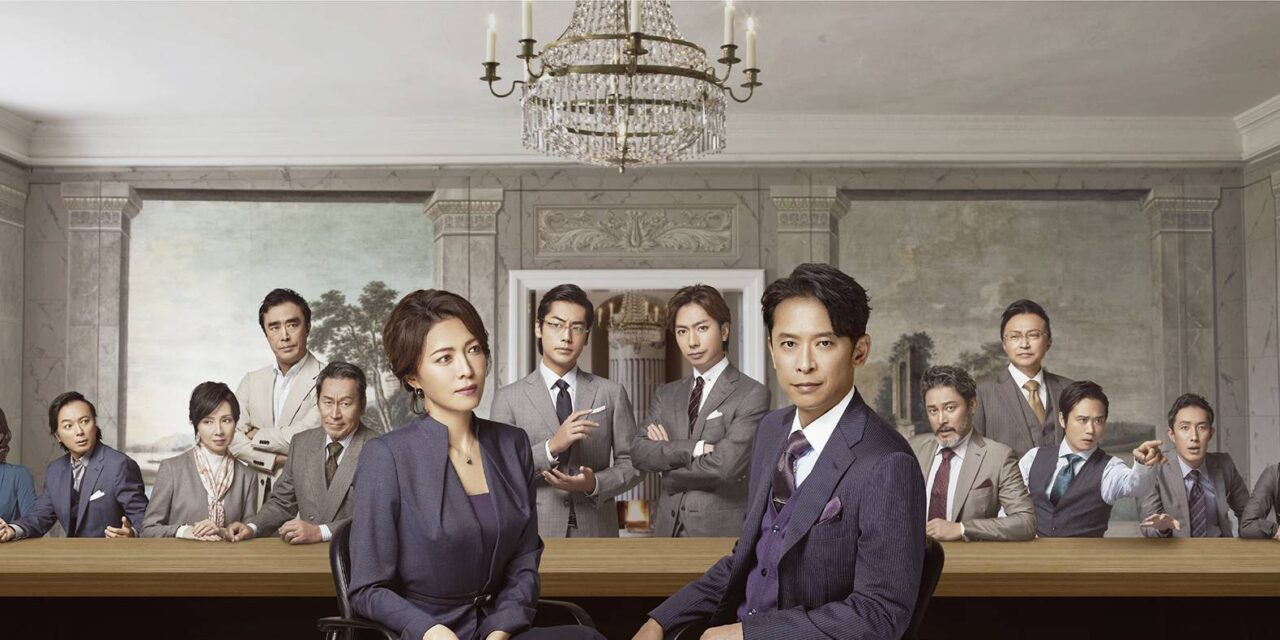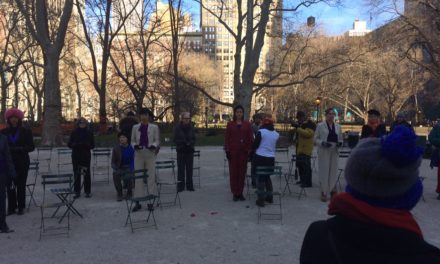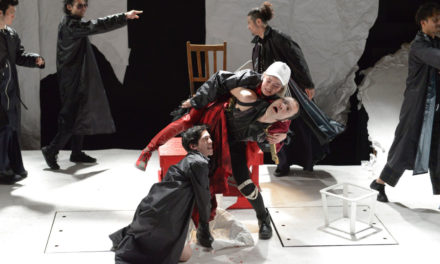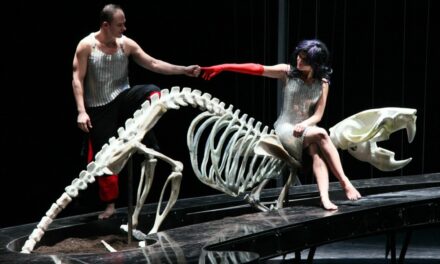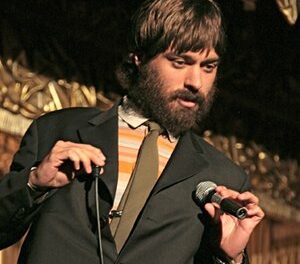He may live in New York, but playwright J.T. Rogers has spent a lot of time in Japan over the past few years, and it’s not just because he loves the food there (“especially the white sliced bread,” he says). One reason is that he’s the creator of an upcoming HBO series based on Tokyo Vice, a 2009 memoir by long-time Japan-based journalist and Japan Times columnist Jake Adelstein. Another is that his Tony award-winning drama, Oslo, opened recently with an all-Japanese cast at the New National Theatre, Tokyo, where it runs through Feb. 23.
“Jake and I have been friends since high school in Missouri,” Rogers, 53, says, “and I’d always wanted to make a show inspired by him creating a new life here as a crime reporter — because, you know, the stakes aren’t like covering insurance,” he adds, referring to Adelstein’s work covering Japan’s yakuza.
But moving on to his more immediate project, Rogers notes that Oslo also has dark undercurrents, as it focuses on the clandestine talks that led to the Oslo Accords, in which the Palestine Liberation Organization (PLO) recognized the State of Israel and Israel recognized the PLO as the representative of the Palestinian people. The play tells the true story of the diplomats and delegates who met outside Oslo in 1993 to work toward peace.
“If the Palestinians were discovered to be doing that, they would be killed; while if the Israeli people were exposed, the government would fall,” Rogers explains in a recent interview.
Rather than presenting a history of the discussions, Rogers’ play — directed by foreign drama specialist Satoshi Kamimura — mixes facts and fiction to dramatize the discussions themselves and show how a Norwegian diplomat couple, Mona Juul (played by Kei Aran) and Terje Rod-Larsen (Masayuki Sakamoto), played key roles in making them happen.
“Rod-Larsen came to New York to see my play Blood and Gifts about CIA spies in Afghanistan,” Rogers says. “He loved it, especially how it’s authentic about diplomacy and what he calls the ‘double gaming’ you have in politics, chess, and with spies — there’s what you see and something underneath that you don’t.
“So we had a drink together, and though I didn’t know him and never met him before, he told me the story of the Oslo Accords from his point of view.”
Rogers says that like most Americans he’d thought President Clinton’s administration was responsible for the landmark agreement, but he was astonished to learn then that there was much more to the story than what was presented in history books.
Instantly fascinated, Rogers thought: “That’s a play I want to write — it’s not a play with a message: It’s a more exciting and thrilling story about politics and people’s passion — and it has humor.”
Soon after, he flew to Norway to interview Rod-Larsen, Juul, and others who were involved.
“Rod-Larsen told me that he, his wife, and other Norwegian diplomats came up with the idea to secretly bring PLO and Israeli government representatives to a mansion in the middle of the woods to drink Scotch and talk about their families and try to make peace,” he says.
Hence, Oslo is what Rogers describes as “historically-true fiction.”
“What I mean is though the main events in the play actually happened, all the dialogue and characters are invented by me, but based on real people,” he says. Some of the characters even very closely resemble their real-life counterparts.
As a dramatist, Rogers says that it was the “super-high tension” surrounding the whole chain of events that appealed to him.
“It was like an actual thriller. People secretly coming into a country. It would be like a revelation that North Korea and South Korea were secretly meeting to end the war. That’s how dangerous these meetings were — but when you write a play, you want the stakes to be high,” he says.
“Also, I was very moved by a story about adversaries who had the courage to come into a room, talk to each other, and treat each other not as enemies, animals, or evil people, but as human beings. In other words, saying ‘I hate your ideas, but I acknowledge that you are a person and I have learned to like you.’ The play is about how people are changed by seeing the humanity in others.”
Regarding the practicalities of fashioning this “historically-true fiction,” Rogers says he usually makes rules when he’s creating a story so he doesn’t “get lost with too many options.”
With Oslo, he made just two: “I only focused on the actual negotiation, not before or after. And also, I wanted the play to be honest and difficult, but I didn’t want it to upset audiences so much they’d stop paying attention to the story.”
Consequently, he opted to not write about central figures, such as PLO Chairman Yasser Arafat and Israeli Prime Minister Yitzhak Rabin, about whom many have strong opinions. Instead, Rogers focused on “those who are one step below the king” with the hope that “people will just follow the play and make up their minds afterward.”
As the world knows, the agreements in the Oslo Accords did not survive long. In light of his experience writing his play, Rogers has some thoughts as to why.
“There was such a hunger in the world for peace that when the 1993 Accord appeared it was shocking and exciting,” he says. “So people didn’t really pay attention to what it actually was. It was presented in the media as a peace deal that solved all the problems — then when more problems happened it was immediately viewed as a failure.
“In reality, however, it was an agreement to make a peace agreement. That was historically momentous, but it wasn’t the same as a peace deal. It was misrepresented by the American press completely, and I don’t think that misunderstanding has been acknowledged enough.”
Even so, I put it to Rogers that because people here are not so familiar with the politics and history of the Middle East, they may not be drawn to a stage dramatization.
Unfazed, he replies, “The play is funny and sexy, and you don’t need to know anything about politics before you go to see it.
“It’s a play, it’s an entertainment, not a lecture. Like Shakespeare’s plays, you don’t need to know anything because the play will tell you.”
Oslo runs through Feb. 23 at the New National Theatre, Tokyo. It then goes on tour to Miyagi, Hyogo, Fukuoka, and Aichi prefectures until March 21. For more information, visit www.oslo2021.com.
This article was originally posted on The Japan Times, and has been reposted with permission. For the original article, click here.
This post was written by the author in their personal capacity.The opinions expressed in this article are the author’s own and do not reflect the view of The Theatre Times, their staff or collaborators.
This post was written by Nobuko Tanaka.
The views expressed here belong to the author and do not necessarily reflect our views and opinions.

